Refugees: Global Trends
When thinking about the growing global forced displacement crisis, we felt we should go directly to the experts: UNHCR, The UN Refugee Agency (USA for UNHCR is a GlobalWA member). With permission, we have republished their summary report on their latest Global Trends report, published in June 2024. You can access the full report and the data here. This report, as you will see, provides key statistical trends on forced displacement, including the latest official statistics on refugees, asylum-seekers, internally displaced and stateless people, as well as the number of refugees who have returned home.
At the end of 2023, an estimated 117.3 million people worldwide were forcibly displaced due to persecution, conflict, violence, human rights violations and events seriously disturbing the public order. Based on operational data, UNHCR estimates that forced displacement has continued to increase in the first four months of 2024 and by the end of April 2024 is likely to have exceeded 120 million. The increase to 117.3 million at the end of 2023 constitutes a rise of 8 per cent or 8.8 million people compared to the end of 2022 and continues a series of year-on-year increases over the last 12 years. One in every 69 people, or 1.5 per cent of the entire world’s population, is now forcibly displaced. This is nearly double the 1 in 125 people who were displaced a decade ago.

“Behind these stark and rising numbers lie countless human tragedies. That suffering must galvanize the international community to act urgently to tackle the root causes of forced displacement.”
Filippo Grandi, the UN High Commissioner for Refugees
People forcibly displaced worldwide | 2014 – 2023
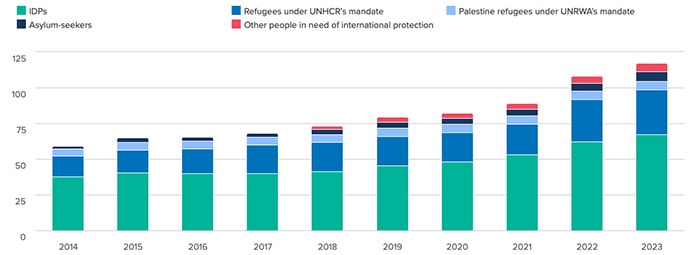
Some Palestine refugees under UNRWA’s mandate in Gaza have also been internally displaced. In this graph, these internally displaced refugees under UNRWA’s mandate are only counted once, under the figure for ‘Palestine refugees under UNRWA’s mandate.
New forced displacements in 2023
New and ongoing conflicts have driven forced displacement across the globe. Conflict in Sudan broke out in April 2023, causing one of the largest humanitarian and displacement crises in the world. More than 6 million people were displaced within the country, with a further 1.2 million fleeing to neighbouring countries. In Myanmar, escalating violence following the military takeover in February 2021, displaced more than 1.3 million people within the country in 2023. While in the State of Palestine, UNRWA estimates that between October and December 2023, up to 1.7 million people (or over 75 per cent of the population) were displaced by the conflict in the Gaza Strip, with some forced to flee multiple times.
Conflict-driven displacement
Forced displacement is a consequence of the failure to uphold peace and security. As the frequency, duration and intensity of conflicts have increased, as measured by conflict-related fatalities in the graph below, so has the number of people forced to flee each year.
Conflict-related fatalities | 2009 – 2023
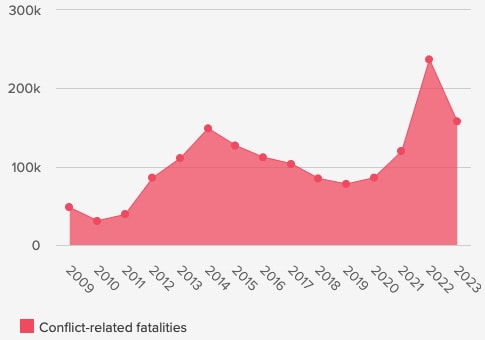
Data on conflict-related deaths provided by the Uppsala Conflict Data Program. Data for 2023 is sourced from the UCDP Candidate Event Dataset, with conflict events with the highest degree of uncertainty excluded (code status equals “Check”). Fatalities combine State-based violence, non-State violence and one-sided violence.
People forced to flee each year | 2009 – 2023
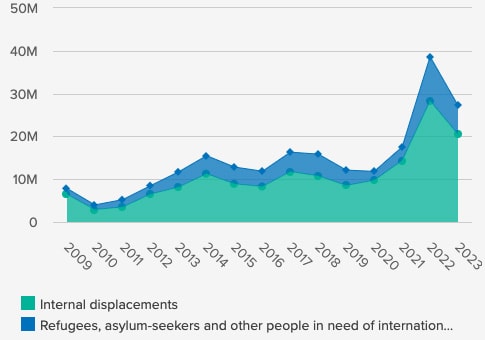
This figure includes estimates of new internal displacements. These refer to movements, and are a comprehensive cumulative figure of displacement. Depending on certain situations the same people can be displaced several times over a given period and would therefore be reported multiple times in the cumulative figures.
Refugees
The global refugee population increased by 7 per cent to reach 43.4 million during the year. This includes 31.6 million refugees and people in a refugee-like situation and 5.8 million other people in need of international protection under UNHCR’s mandate, as well as 6 million Palestinian refugees under UNRWA’s mandate. Compared to a decade ago, the total number of refugees globally has more than tripled. The largest proportion of refugees globally were from Afghanistan and Syria, both with 6.4 million each, and together equivalent to one-third of all refugees under UNHCR’s mandate. These were followed by Venezuela (6.1 million refugees and other people in need of international protection) and Ukraine (6.0 million refugees). Most refugees remain near their country of origin, with 69 per cent hosted in neighbouring countries at the end of 2023. Low- and middle-income countries continue to host the majority of the world’s refugees, with 75 per cent of refugees living in low- and middle-income countries.

SPOTLIGHT
Route-based approach

© UNHCR/Alessio Mamo
Refugees fleeing conflict or persecution may travel on routes alongside migrants. While the rights of refugees and migrants are distinct, those using the same routes face similar risks. According to interviews with 31,500 refugees and migrants along the Central Mediterranean route, the predominant risks include severe threats to life, rape, torture, kidnapping, arbitrary detention, robbery and human trafficking, among other risks. Between 2021 and 2023, 950 people are known to have died while crossing the Sahara Desert, although the actual number is believed to be much higher. During the same period, 7,600 people on the move died or went missing in the Mediterranean Sea. UNHCR is working with partners to develop a data-driven route-based approach to strengthen protection for refugees and migrants, ensuring they have access to the services they need along key routes.
Internally displaced people
Most people who are forced to flee never cross an international border, remaining displaced within their own countries. Known as internally displaced people, or IDPs, they account for 58 per cent of all forcibly displaced people. At the end of 2023, 68.3 million people remained internally displaced due to conflict and violence. An estimated 9.1 million people were displaced within Sudan, the largest internally displaced population ever reported. This was followed by Syria (7.2 million), and the Democratic Republic of the Congo (6.7 million).

SPOTLIGHT
Conflict in Sudan
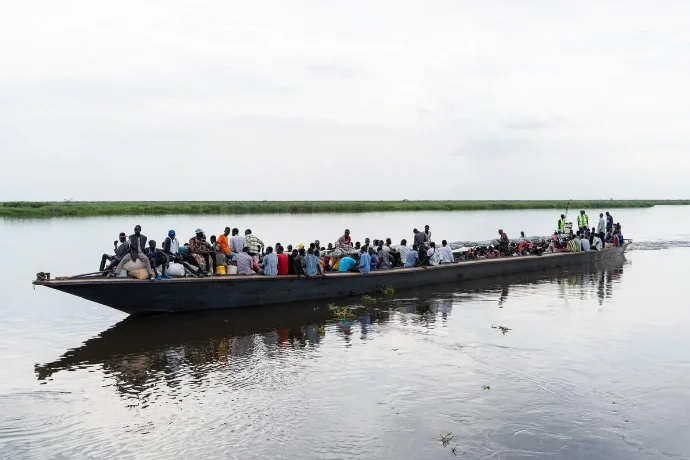
Pictured: Sudanese refugees and South Sudanese returnees travel on a crowded barge from Renk to Malakal, South Sudan. The journey will take two days. © UNHCR/Ala Kheir
Conflict in Sudan broke out in April 2023. An estimated 1.2 million people had fled the country by the end of the year, with almost all Sudanese refugees hosted by neighboring countries. A further 9.1 million Sudanese were displaced within the country, including people displaced by previous conflict. Sudan now has the largest internally displaced population ever reported. Prior to the April conflict, Sudan was also host to almost 1 million refugees, primarily from Eritrea, South Sudan and Syria. Many were forced to return to their home countries prematurely or move on to other countries. Thousands of people are still being displaced in Sudan daily. Hunger is widespread, with 20 million people (42 per cent of the entire population) facing acute food insecurity.
Solutions
In 2023, nearly 1.1 million refugees from 39 countries decided to return home from a total of 93 countries of asylum. Four out of five of those returning were Ukrainian or South Sudanese. However, as most returns occurred in contexts not entirely conducive to return in safety and dignity, they may not be sustainable. In addition, 5.1 million people displaced within their own country returned to their place of origin during the year. Nearly 62 per cent of all IDP returns were within the Democratic Republic of the Congo (1.8 million) and Ukraine (1.3 million). According to official government data, 158,700 refugees were resettled to third countries in 2023, representing 35 per cent more (40,000) than during the previous year. Despite the uptick in numbers, this still only accounted for 8 per cent of the estimated 2 million individuals globally identified by UNHCR as in need of resettlement. A further 30,800 refugees acquired the citizenship of their host country during the year and were locally integrated.
Durable solutions for refugees | 2019 – 2023
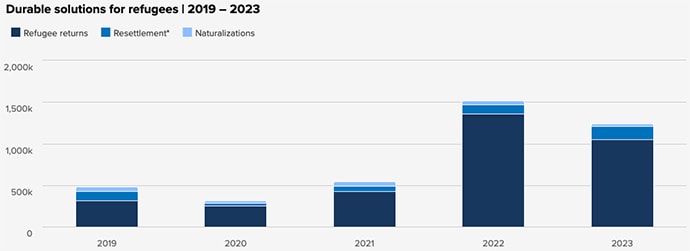
* Resettlement figures are according to government statistics.
SPOTLIGHT
Forced displacement and climate change
Climate change is exacerbating the protection needs and risks for forcibly displaced people and contributing to new, onward and protracted displacement. Extreme weather events, such as droughts, floods and extreme heat, are becoming more frequent and more intense. These have often impacted countries experiencing new or escalating conflicts. Without urgent adaptation, mitigation and measures to address loss and damage, climate change impacts are expected to increasingly, and disproportionately, affect climate vulnerable States and communities, including forcibly displaced people.
At the end of 2023, almost 3 in 4 forcibly displaced people were living in countries with high-to-extreme exposure to climate-related hazards.
Nearly 1 in 2 were living in countries where they also remained exposed to conflict.
Climate-related hazards, countries with more than one conflict-related death per 100,000 (2022) and the number of forcibly displaced people per country (2023)

Climate-related hazards is an average in the period between 1981 and 2010. The number of forcibly displaced people located in a country (2023) and countries with more than one conflict-related death per 100,000 (2022) are indicated on top. © UNHCR
In addition to the above-mentioned members, the following GlobalWA members and Pangea grant partners have programs and services in the communities where they work to assist refugees and displaced persons:
With over 117 million people forcibly displaced worldwide, including 43 million refugees, this crisis is one of the defining challenges of our time. Amid the immense hardships caused by war, political instability and the growing threat of climate disasters, it is crucial to remember that health is a human right that transcends borders.
For more than four decades, Americares has worked alongside partner organizations to meet the health needs of refugees and other displaced populations globally. Americares is currently supporting people displaced by natural disasters, those displaced by war in Gaza, Syria and Ukraine and those fleeing the crisis in Venezuela.
In Gaza, Americares is responding to the health needs of families affected by the war, delivering over 23 tons of medicine and medical supplies, supporting mobile medical teams and providing mental health support for frontline health workers. And in Colombia, Americares health clinics have been a lifeline for Venezuelans who have been forced to flee due to the mounting crisis in the country.
As the refugee crisis grows, Americares remains committed to providing displaced populations the health care they need to survive, recover and rebuild their lives.
Global Communities has a rich history of providing emergency aid and protection services to refugees and internally displaced people in many crisis settings, from Ukraine and Gaza to Syria and Guatemala. This includes our Child Protection in Emergencies programming, which supports the well-being of children and addresses risks created or exacerbated by crises, such as abuse and family separation. We build protective environments, strengthen children’s resilience and work to prevent further harm. In Syria, for example, we manage several Child-Friendly Spaces (CFS) for children living in displacement camps. Given the dire conditions in the camps, CFS create safe and welcoming environments where children engage in age-appropriate activities, receive psychosocial services and learn positive coping mechanisms. We also offer parenting sessions and cash assistance, for instance, to ensure that children have stable housing. In Ukraine, we partner with community-based organizations to fill gaps in state services. We engage children in art therapy classes, learn and play activities, and community events to support their healing and recovery. We also foster social cohesion between displaced people and host communities. For example, our recreational activities bring children from the community together with those who have fled the fighting to encourage integration and minimize tensions.
Global Mentorship Initiative is a US-based global nonprofit bridging the gap between graduation and first career jobs for underrepresented young professionals and refugees from diverse communities. Through leveraging digital resources, mentorship, AI, and human connection, we are building a more equitable workforce of tomorrow’s leaders.
GMI’s flagship program is a structured, 12-week, virtual, one-to-one mentorship with a career professional. In four years, GMI has scaled from supporting 20 students to now over 7,000 in 100 countries, including 8 refugee camps.
GMI has supported over 500 refugee learners, many living in camps across Africa and Lebanon. 72% are employed within six months of graduating, in camps where the formal employment rate can be as low as 10%. GMI has partnered with the UNHCR to mentor 1,000 refugee learners over the next two years and support our corporate partners in hiring these bright, motivated candidates. For more information about how you can mentor, sponsor, or hire refugee learners, please contact ravenna.hennane@globalmentorship.org.
International Rescue Committee
Founded at the call of Albert Einstein in 1933, the International Rescue (IRC) helps people whose lives are shattered by conflict and disaster to survive, recover, and gain control of their future. IRC has provided services to uprooted children and families for over 90 years globally, and in Seattle since 1976. Our approach has four important aspects:
- Toughest places focus. Responding quickly and aiming to stay as long as needed in the world’s toughest and most remote places.
- Putting people first. Developing and deploying a wide range of programs to address people’s needs and make the greatest impact.
- Relentless improvement. Constantly adapting and improving our programs.
- Building community. Helping people become part of their new communities worldwide, including Europe and the Americas.
In over 40 countries, the IRC is one of the only global organizations that works across the entire arc of crisis—from war zones to refugee resettlements—as we help millions from harm to a new home.
In Washington, for most newly arrived families, IRC is the hand that leads them through finding housing and employment, enrolling children into schools, and finding healthcare.
Sign up for our Newsletter to our local Seattle office to stay updated with all activities. Please contact Gul Siddiqi, Development Manager, at gul.siddiqi@rescue.org for any questions related to Donations, Corporate Volunteer Engagement, In-Kind Drives, and Partnerships.
War, violence, and oppression have displaced millions globally, with Africa experiencing the fastest-growing refugee crisis. Refugees face trauma, unsafe conditions, and competition over dwindling resources, leading to hunger and instability. Mercy Corps tackles poverty and displacement by addressing root causes and supporting long-term recovery after other organizations leave. Their first priority is meeting immediate needs—providing food, water, clothing, and hygiene essentials. Then, they focus on long-term recovery, offering cash assistance through e-cash or vouchers to help refugees meet personal needs, restart businesses, and regain independence.
Mercy Corps also emphasizes mental health support. Conflict-affected children and youth access skill-building activities, helping restore normalcy and meet psychosocial needs. Women and LGBTQ+ individuals are connected with support networks, helping them rebuild their lives in new environments.
Operation Snow Leopard (OSL) is a US-based nonprofit founded immediately after Kabul’s fall in August 2021. OSL’s primary mission is to safely evacuate and resettle at-risk Afghans, with a strong focus on women and children. We assist vulnerable groups, including women leaders, human rights defenders, lawyers, journalists, interpreters, doctors, activists, and religious minorities. Entirely run by volunteers, including former military personnel, civilians, and Afghans, OSL has conducted dozens of missions, helping nearly 1900 at-risk Afghans evacuate and relocate. OSL raises funds for mission essentials like food, lodging, medical care, travel, and documentation (passports, visas) for Afghans.
Since August 2021, OSL accepted a specific mission to help female Afghan Parliamentarians who were at risk of Taliban retribution. Despite engaging with over forty nations for resettlement pathways over the past two years, OSL was surprised to receive only a few offers. In 2022, OSL partnered with the Inter-Parliamentary Union, participating in international dialogues to aid at-risk Parliamentarians. OSL’s efforts included attending IPU General Assemblies in Bahrain and Geneva and coordinating with the UN. However, despite some progress, government and international institutions have not resolved these high-profile individuals’ resettlement issues. OSL actively renews calls for countries to accept these courageous women and their staff, who bravely risked everything when they stood up for democracy.
Outright International works with partners around the globe to strengthen the capacity of the LGBTIQ human rights movement, document and amplify human rights violations, and advocate for inclusion and equality. As part of this mission, Outright aims to ensure that LGBTIQ people are fully integrated throughout all elements of the humanitarian program cycle, with the goal of improving respect for, protection of, and fulfillment of the rights of LGBTIQ people before, during, and after humanitarian crises. This includes advocating with and supporting humanitarian coordination systems and actors to be more inclusive of LGBTIQ people and organizations; preparing and creating opportunities for LGBTIQ activists to engage with and influence these systems and actors; co-developing, promoting, and increasing inclusive humanitarian programming by LGBTIQ groups and within mainstream organizations; and ensuring that measurement, evaluation, accountability, and learning systems are more sensitive and responsive to LGBTIQ people affected by crisis.
Around the world, Oxfam partners with local organizations to help refugees and other displaced people with their immediate basic needs for clean water, shelter, food, and work as well as advocate for their long-term wellbeing—both in their own nations, and in the countries that host them. We engage with allies and government officials at all levels to focus on peace and find sustainable solutions to the conflict and violence that ruin so many lives. We push for wealthy countries to welcome refugees and boldly attend to their needs. And we advocate for public policies that protect the rights of displaced families as they strive to rebuild their lives and fight to provide for their children a more equal future—in their own countries or the ones in which they settle. Read more.
The 2021 military coup in Myanmar/Burma has led to a humanitarian crisis of staggering proportions. Refugee families, activists, and internally displaced peoples (IDPs) struggle to rebuild their lives along Myanmar/Burma’s borders amidst ongoing turmoil. The situation has worsened in 2024, with increased airstrikes on civilian areas and a conscription campaign targeting youth. Compounding this man-made disaster, the recent devastation wrought by Typhoon Yagi has forced hundreds of thousands more from their homes, exacerbating an already dire situation and stretching limited resources to the breaking point.
The crisis has far-reaching consequences, including a potential brain drain, with over half of highly skilled graduates wanting to emigrate. Neighboring countries like Thailand and Bangladesh grapple with the influx, often labeling refugees as “illegals,” in ways that echo immigration debates in the U.S.
The Myanmar military’s actions have been devastating, with thousands of civilians killed, millions displaced, and tens of thousands of homes destroyed. Despite recent setbacks for the military, the situation remains dire for those affected.
In response, Partners Asia is supporting dozens of local organizations and their visionary leaders who organize essential education, health, and livelihood programs for people who have had to flee their homes, channeling crucial funding to these grassroots efforts. While the challenges are immense, we remain committed to providing support to our unstoppable partners and fueling hope for those affected by this ongoing crisis.
Seattle International Foundation
Seattle International Foundation (SIF) believes in just, peaceful and prosperous societies in Central America, and that Central Americans should not be forced to leave their communities in search of refuge and safety. We work to build good governance and equity in order to address key political and social challenges in the region, including authoritarianism, human rights violations, corruption, impunity, violence, gender inequality, and discrimination, as they are push factors for forced displacement and migration.
We invest in organized civil society and independent actors at the forefront of advocacy efforts and to serve as the voice of the public and in independent media whose work increases transparency and accountability of actors in power. We bring together donors and international actors supporting Central America with Central American civil society leaders, including those who have gone into exile for political persecution, so that they can exchange experiences and build strategies to address the main drivers of irregular migration. Above all, we champion the visions of local communities in their efforts to demand political and social change and build the countries they dream of.
Pangea Grant Partners – Refugees
East Africa
Solidarity Eden Foundation, Uganda
2023 funds were used to expand the Women on Wheels program to equip 100 refugee women to gain financial independence: extensive tailing and business training combined with mentoring, mental health support and internships with established tailors. This is a comprehensive program ameliorating the trauma of refugee reality with training and gainful employment.
SE Asia
FORTUNE, Thailand
FORTUNE, a grassroots organization in Fang District in Northern Thailand, is the newest grant partner in Southeast Asia. It was founded in 2009. Its mission is to address the community and human rights needs of Myanmar ethnic migrant workers (many undocumented) who live and work in migrant camps on agricultural farms along the Thai-Myanmar border. FORTUNE provides support to Myanmar refugees and migrant workers living in Thailand.